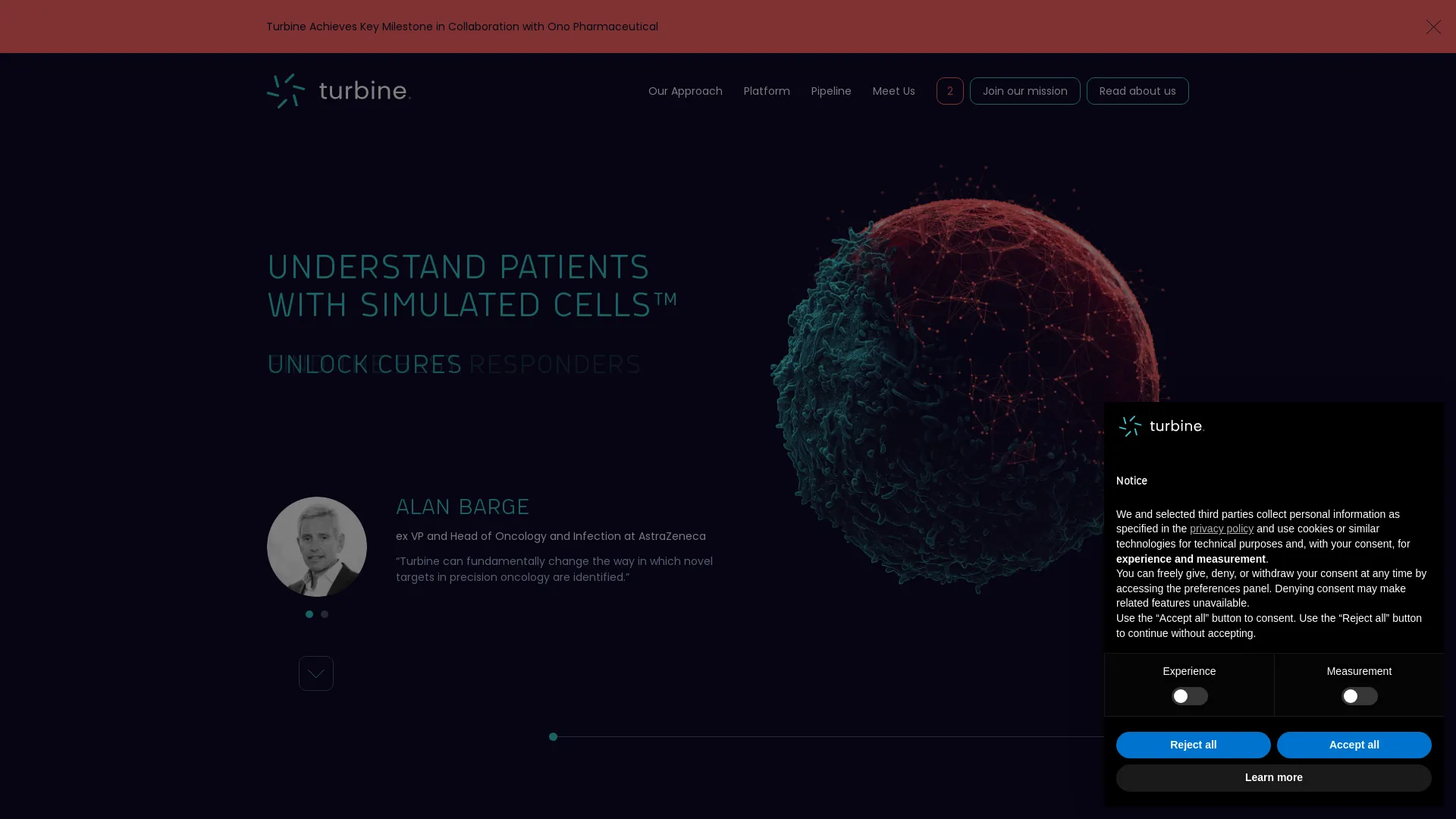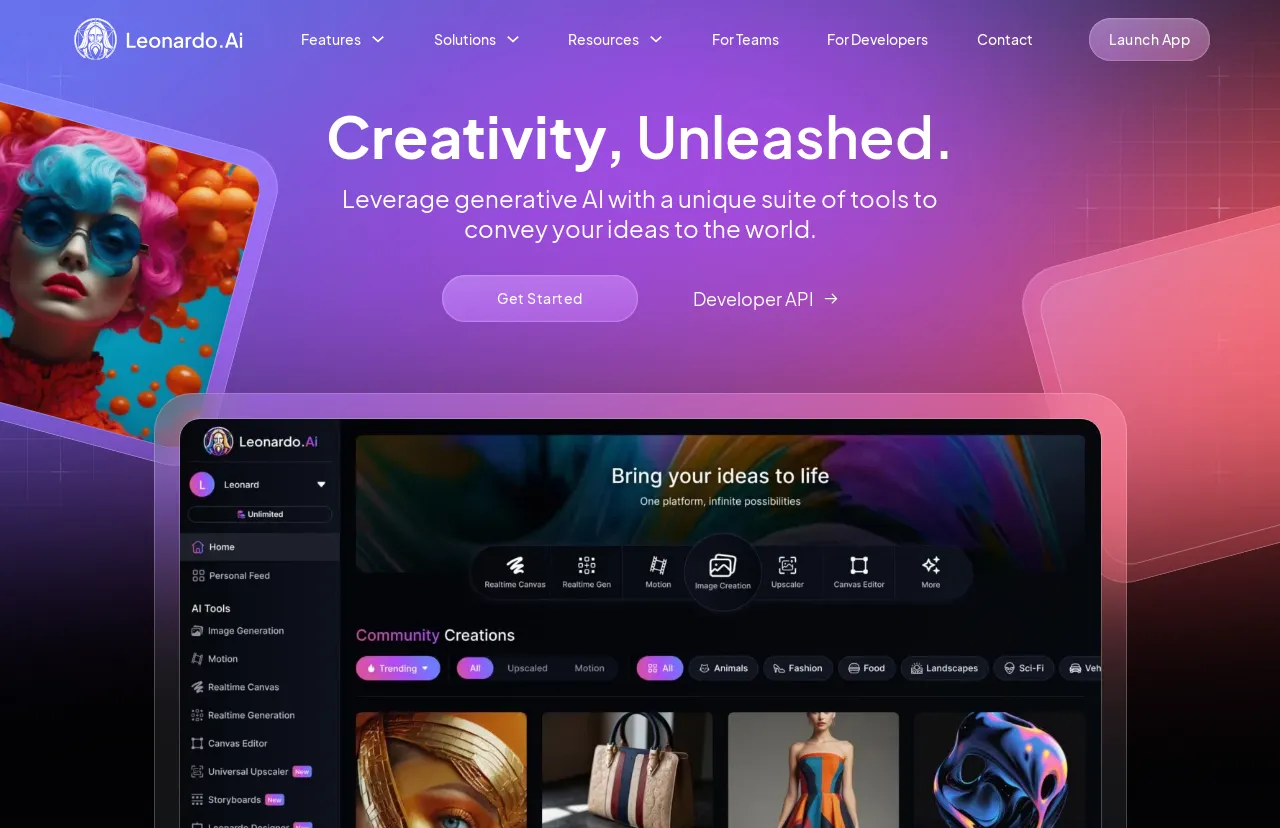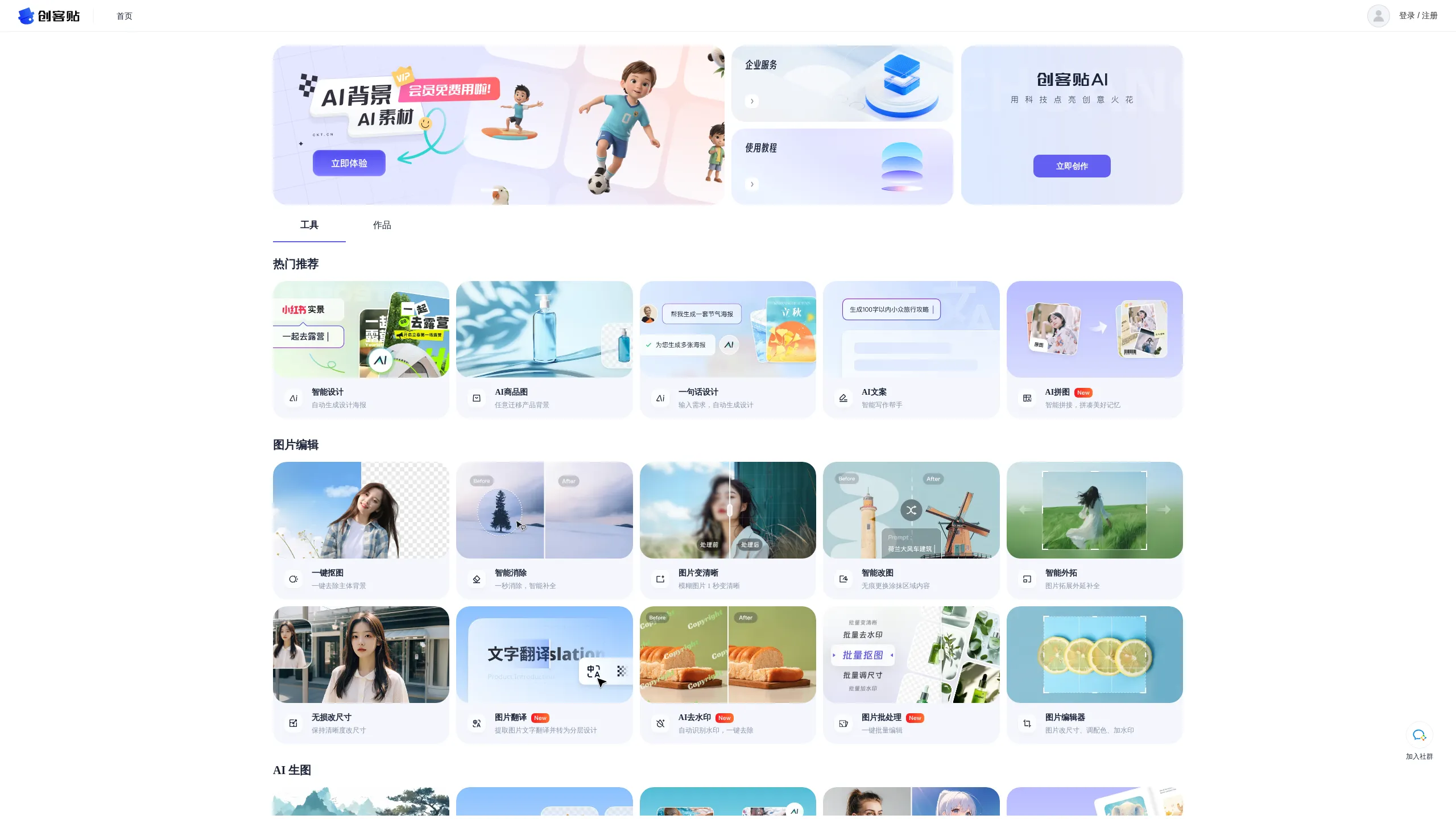
Turbine AI Details
Product Information
Product Description
Turbine.ai
Revolutionizing Cancer Treatment with Simulated Cells™
Turbine.ai is a pioneering company dedicated to revolutionizing cancer treatment through the power of AI and computational biology. Our mission is to unlock novel therapies and accelerate drug discovery by understanding complex cancer mechanisms at an unprecedented level. We achieve this through our innovative Simulated Cells™ platform, a powerful tool that allows us to simulate the behavior of individual tumor cells in patients.
Our Approach
Simulations Capture Patient Biology Where Experiments Fail
Traditional drug discovery methods face significant challenges in capturing the complex biology of cancer in real patients. In vitro and in vivo models often fail to accurately reflect human disease, leading to costly and time-consuming experiments with low translation rates to the clinic.
Turbine.ai addresses these limitations by leveraging computational simulations. Our platform enables us to computationally simulate tumor cell behavior, understanding the intricate mechanisms driving the disease. These simulations provide valuable insights into the right modality and combination approach for treating even the most resistant cancers.
Our Platform
Engineering a way to understand biology
Our Simulated Cells™ platform is built upon a foundation of machine learning and network science. We map and model the complex interactions of thousands of signaling proteins within a cell, creating a comprehensive representation of cancer behavior at the cellular level. This allows us to predict how different therapies, including those that don't yet exist, might affect the cells of individual patients.
The platform works by:
- Model building and training: We use a standardized “wiring diagram” for all in vitro and in vivo models, with patient modeling currently under development. Our bioplatform allows the setup of cells with distinct OMICS profiles. Behavior training for the models is a special case of Recurrent Neural Networks, using Tensorflow. Models prepared for simulations are trained on 500,000+ data points (CRISPR, drug sensitivity viability, and post-treatment RNASeq assays).
- Biomarkers: We finish model setup by creating copies with different biomarkers to pinpoint the ideal responders for specific perturbations. We can specify extrinsic molecular alterations, to generate a high number of models representative of patients, but non-existent in vitro.
- Simulation and hypotheses generation: We can introduce interventions at scale, using a versatile toolkit of dose-dependent inhibition, interaction level perturbation, or combination screens. Simulating perturbations of models, biomarkers, and even combinational therapies, we generate a complex molecular readout of dose responses and IC50 values.
- Translation: Filtering and evaluating simulation results enables us to reveal hidden mechanisms behind patient-specific response and its driving effects.
- Experimental validation: Unique insights on mechanism and the associated biomarkers enable an optimized process of state-of-the-art experimental validation. Average pathway activity in sensitive and control cells is calculated with a proprietary, footprint-based method based on RNA-sequencing.
Our platform represents a significant step forward in cancer research. By providing a comprehensive understanding of individual tumor cell behavior, we can accelerate the development of more effective and personalized treatments.
Our Pipeline
A Single Platform to Rationalize the Entire R&D Process
Our Simulated Cells™ platform is more than just a tool for understanding cancer. It is a comprehensive platform that streamlines the entire R&D process, from target identification to clinical trials. The platform offers a range of capabilities that enable us to:
- Understand the disease: Simulate cancer behavior to understand drivers of disease and mechanisms of resistance observed in clinical settings.
- Find the ideal patients: Uncover the ideal patient population and combination strategy for therapies already in development or on the market.
- Expand the search space: Identify truly novel targets to manage unmet need in patients who don't benefit from existing therapies.
Our platform has already been utilized in collaborations with leading pharmaceutical companies, demonstrating its effectiveness in accelerating drug discovery and development.
Meet Us
Building Deep Tech for Deep Biology
Turbine.ai is a team of passionate scientists, engineers, and entrepreneurs who are committed to making a real difference in the fight against cancer. We believe that by combining our expertise in deep technology, molecular biology, and translational science, we can unlock the potential for truly impactful therapies.
Simulations capture patient biology where experiments fail
DRUG DISCOVERY IS LIMITED BY OUR TOOLS TO UNDERSTAND DISEASE The complexity of the model systems sharply increases along the drug discovery process, while only a limited number of experimental models are available that accurately reflect human disease. Conventional in vitro and in vivo models cannot capture disease behavior in real patients, and tools – like CRISPR – don’t act like actual drugs. Drug discovery is costly, time consuming, model systems have poor translation rates to patients and do not significantly reduce the risk of failure in the clinic. This makes it incredibly hard to translate preclinical hypotheses to the clinic and create targeted drugs that truly help. SIMULATIONS UNCOVER TREATMENTS AND THE PATIENTS WHO BENEFIT Before running any wet lab experiments, Turbine computationally simulates tumor cell behavior in patients to understand the complex mechanisms driving the disease. Simulations can reveal the right modality and combination approach to treat even the most resistant cancers. Observing these in silico experiments our biologists and translational experts gain insight into the molecular context by which mono- and combination therapies can potentially lead to patient benefit. Guiding the R&D process with simulations can increase the chance of success in the clinic. https://pubmed.ncbi.nlm.nih.gov/14518029/ https://www.nature.com/articles/s41467-021-25175-5 globaldata.com How does it work? Contact Us
Engineering a way to understand biology
THE WORLD’S FIRST INTERPRETABLE CELL SIMULATION PLATFORM AUGMENTED BY MACHINE LEARNING Pioneering an approach that combines simulation with machine learning, we map and model how thousands of signaling proteins interact characterizing cellular level cancer behavior and response or resistance to treatment. Our platform enables the simulation of drug-like effects from compounds that may not exist yet, on cells potentially unavailable for lab-based testing, like those of high unmet need cancer patients. PREDICT NOVEL EXPERIMENTS TO FIND DRUGS NO-ONE HAS EVER THOUGHT OF This approach will potentially allow us to predict not only what works in cells, mice and people but more importantly, why and how. Continuous iterations of simulations and proprietary in vitro and in vivo experiments confirm predictions and progress our pipeline while simultaneously improving the underlying Simulated Cell™. As all programs and partnerships run on the latest version of the in silico cell model, training benefits accumulate, leading to a constantly improving platform. Using results to both generate the initial idea and to guide its iterations, as the models improve, this leads to a more rational process to undestand the underlying disease biology. Our benchmarks show that simulations prevent 2 out of 3 failed experiments in vitro and every 2nd failure in vivo as well. Case studies Benchmark Suite
FAQFAQ
Turbine AI is a company that uses AI to understand the mechanisms of cancer and unlock novel therapies. It leverages an evolving, predictive platform with Simulated Cells™ to understand patient biology where experiments fail.
Simulated Cells™ are a computational model of human cells that Turbine AI uses to predict how different drugs will affect them. These models are trained on a massive amount of data, including CRISPR, drug sensitivity viability, and post-treatment RNASeq assays. The Simulated Cells™ can then be used to simulate the effects of new drugs, even those that don't yet exist.
Turbine AI uses Simulated Cells™ to predict the effects of different drugs on cancer cells. This allows them to identify potential new therapies and biomarkers, as well as the ideal patients who will benefit from those therapies. By using simulations, Turbine AI can also help to reduce the risk of failure in clinical trials.
Turbine AI's platform offers several benefits, including:
- Reduced risk of failure in clinical trials: Turbine AI's simulations can help to predict which drugs are likely to be successful in clinical trials, reducing the risk of failure and saving time and money.
- Identification of novel targets: Turbine AI's platform can identify potential new drug targets that haven't been explored before. This is essential for developing treatments for diseases with high unmet need.
- Improved patient selection: Turbine AI's simulations can help to identify the ideal patients who will benefit from specific therapies.
Turbine AI takes a three-pronged approach to drug discovery:
- Understanding the disease: Simulating cancer behavior to understand drivers of disease & mechanisms of resistance observed in clinical settings.
- Finding the ideal patients: Uncovering ideal patient population and combination strategy for therapies already in development or on the market.
- Expanding the search space: Identifying truly novel targets to manage unmet need in patients who don’t benefit from existing therapies.
Turbine AI has partnered with several leading pharmaceutical companies, including:
- Ono Pharmaceutical
- Merck
- Ginkgo Bioworks
- RA Capital Management
- MassMutual Ventures
- Delin Ventures
- Mercia Ventures
You can learn more about Turbine AI by visiting their website at https://turbine.ai/. You can also follow them on social media at Facebook, LinkedIn, and Instagram.
You can contact Turbine AI by filling out the form on their website or by emailing them at [email protected].
Website Traffic
Visits
| Date | Visits |
|---|---|
| 2024-06-01 | 5601 |
| 2024-07-01 | 5965 |
| 2024-08-01 | 6277 |
Metric
| Metric | Value |
|---|---|
| Bounce Rate | 36.09% |
| Pages Per Visit | 3.40 |
| Average Visit Duration | 181.19 s |
Geography
| Country | Share |
|---|---|
🇭🇺 Hungary | 62.71% |
🇺🇸 United States of America | 25.16% |
🇬🇧 United Kingdom | 10.91% |
🇵🇰 Pakistan | 1.22% |
Source
| Source | Value |
|---|---|
| Search | 47.90% |
| Direct Access | 36.33% |
| Referrals | 8.68% |
| Social Media | 5.77% |
| Paid Referrals | 1.20% |
| 0.13% |
Alternative Products

绘AI
Image Generation
Ai Drawing

Leonardo AI
Image Generation
Creativity, Unleashed. Empowering your creative vision with generative AI.

AI Art
Image Generation
AI Graphic Creation Platform

360 AI
Image Generation
AI Creates Stunning Artwork

Stockimg AI
Image Generation
Stop wasting time on content production. Try it for free right now and manage your social media with AI!

6pen Art
Image Generation
Turn your imagination into art